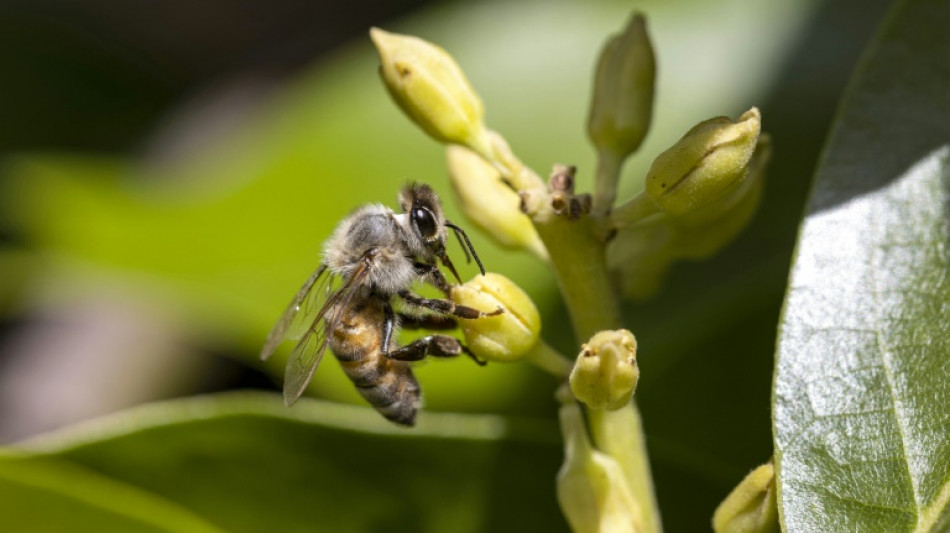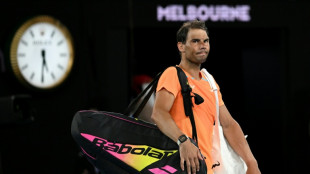
-
 Epstein survivors say abusers 'remain hidden' after latest files release
Epstein survivors say abusers 'remain hidden' after latest files release
-
'Full respect' for Djokovic but Nadal tips Alcaraz for Melbourne title

-
 Wollaston goes back-to-back in the Cadel Evans road race
Wollaston goes back-to-back in the Cadel Evans road race
-
Women in ties return as feminism faces pushback

-
 Ship ahoy! Prague's homeless find safe haven on river boat
Ship ahoy! Prague's homeless find safe haven on river boat
-
Britain's Starmer ends China trip aimed at reset despite Trump warning

-
 Carlos Alcaraz: rare tennis talent with shades of Federer
Carlos Alcaraz: rare tennis talent with shades of Federer
-
Novak Djokovic: divisive tennis great on brink of history

-
 History beckons for Djokovic and Alcaraz in Australian Open final
History beckons for Djokovic and Alcaraz in Australian Open final
-
Harrison, Skupski win Australian Open men's doubles title

-
 Epstein offered ex-prince Andrew meeting with Russian woman: files
Epstein offered ex-prince Andrew meeting with Russian woman: files
-
Jokic scores 31 to propel Nuggets over Clippers in injury return

-
 Montreal studio rises from dark basement office to 'Stranger Things'
Montreal studio rises from dark basement office to 'Stranger Things'
-
US government shuts down but quick resolution expected

-
 Mertens and Zhang win Australian Open women's doubles title
Mertens and Zhang win Australian Open women's doubles title
-
Venezuelan interim president announces mass amnesty push

-
 China factory activity loses steam in January
China factory activity loses steam in January
-
Melania Trump's atypical, divisive doc opens in theatres

-
 Bad Bunny set for historic one-two punch at Grammys, Super Bowl
Bad Bunny set for historic one-two punch at Grammys, Super Bowl
-
Five things to watch for on Grammys night Sunday

-
 Venezuelan interim president proposes mass amnesty law
Venezuelan interim president proposes mass amnesty law
-
Rose stretches lead at Torrey Pines as Koepka makes cut

-
 Online foes Trump, Petro set for White House face-to-face
Online foes Trump, Petro set for White House face-to-face
-
Seattle Seahawks deny plans for post-Super Bowl sale

-
 US Senate passes deal expected to shorten shutdown
US Senate passes deal expected to shorten shutdown
-
'Misrepresent reality': AI-altered shooting image surfaces in US Senate

-
 Thousands rally in Minneapolis as immigration anger boils
Thousands rally in Minneapolis as immigration anger boils
-
US judge blocks death penalty for alleged health CEO killer Mangione

-
 Lens win to reclaim top spot in Ligue 1 from PSG
Lens win to reclaim top spot in Ligue 1 from PSG
-
Gold, silver prices tumble as investors soothed by Trump Fed pick

-
 Ko, Woad share lead at LPGA season opener
Ko, Woad share lead at LPGA season opener
-
US Senate votes on funding deal - but shutdown still imminent

-
 US charges prominent journalist after Minneapolis protest coverage
US charges prominent journalist after Minneapolis protest coverage
-
Trump expects Iran to seek deal to avoid US strikes

-
 Guterres warns UN risks 'imminent financial collapse'
Guterres warns UN risks 'imminent financial collapse'
-
NASA delays Moon mission over frigid weather

-
 First competitors settle into Milan's Olympic village
First competitors settle into Milan's Olympic village
-
Fela Kuti: first African to get Grammys Lifetime Achievement Award

-
 'Schitt's Creek' star Catherine O'Hara dead at 71
'Schitt's Creek' star Catherine O'Hara dead at 71
-
Curran hat-trick seals 11 run DLS win for England over Sri Lanka

-
 Cubans queue for fuel as Trump issues energy ultimatum
Cubans queue for fuel as Trump issues energy ultimatum
-
France rescues over 6,000 UK-bound Channel migrants in 2025

-
 Surprise appointment Riera named Frankfurt coach
Surprise appointment Riera named Frankfurt coach
-
Maersk to take over Panama Canal port operations from HK firm

-
 US arrests prominent journalist after Minneapolis protest coverage
US arrests prominent journalist after Minneapolis protest coverage
-
Analysts say Kevin Warsh a safe choice for US Fed chair

-
 Trump predicts Iran will seek deal to avoid US strikes
Trump predicts Iran will seek deal to avoid US strikes
-
US oil giants say it's early days on potential Venezuela boom

-
 Fela Kuti to be first African to get Grammys Lifetime Achievement Award
Fela Kuti to be first African to get Grammys Lifetime Achievement Award
-
Trump says Iran wants deal, US 'armada' larger than in Venezuela raid


Insect compasses, fire-fighting vines: 2023's nature-inspired tech
Even as human-caused climate change threatens the environment, nature continues to inspire our technological advancement.
"The solutions that are provided by nature have evolved for billions of years and tested repeatedly every day since the beginning of time," said Evripidis Gkanias, a University of Edinburgh researcher.
Gkanias has a special interest in how nature can educate artificial intelligence.
"Human creativity might be fascinating, but it cannot reach nature's robustness -- and engineers know that," he told AFP.
From compasses mimicking insect eyes to forest fire-fighting robots that behave like vines, here's a selection of this year's nature-based technology.
- Insect compass -
Some insects -– such as ants and bees -– navigate visually based on the intensity and polarisation of sunlight, thus using the sun's position as a reference point.
Researchers replicated their eye structure to construct a compass capable of estimating the sun's location in the sky, even on cloudy days.
Common compasses rely on Earth's weak magnetic field to navigate, which is easily disturbed by noise from electronics.
A prototype of the light-detecting compass is "already working great", said Gkanias, who led the study published in Communications Engineering.
"With the appropriate funding, this could easily be transformed into a more compact and lightweight product" freely available, he added.
And with a little further tweaking, the insect compass could work on any planet where a big celestial light source is visible.
- Water-collecting webs -
Fabric inspired by the silky threads of a spider web and capable of collecting drinking water from morning mist could soon play an important role in regions suffering water scarcity.
The artificial threads draw from the feather-legged spider, whose intricate "spindle-knots" allow large water droplets to move and collect on its web.
Once the material can be mass produced, the water harvested could reach a "considerable scale for real application", Yongmei Zheng, a co-author of the study published in Advanced Functional Materials, told AFP.
- Fire-fighting vines -
Animals aren't the only source of inspiration from nature.
Scientists have created an inflatable robot that "grows" in the direction of light or heat, in the same way vines creep up a wall or across a forest floor.
The roughly two-metre-long tubular robot can steer itself using fluid-filled pouches rather than costly electronics.
In time, these robots could find hot spots and deliver fire suppression agents, say researchers at the University of California, Santa Barbara.
"These robots are slow, but that is OK for fighting smouldering fires, such as peat fires, which can be a major source of carbon emissions," co-author Charles Xiao told AFP.
But before the robots can climb the terrain, they need to be more heat-resistant and agile.
- Kombucha circuits -
Scientists at the Unconventional Computing Laboratory at the University of the West of England in Bristol have found a way to use slimy kombucha mats –- produced by yeast and bacteria during the fermenting of the popular tea-based drink -- to create "kombucha electronics".
The scientists printed electrical circuits onto dried mats that were capable of illuminating small LED lights.
Dry kombucha mats share properties of textiles or even leather. But they are sustainable and biodegradable, and can even be immersed in water for days without being destroyed, said the authors.
"Kombucha wearables could potentially incorporate sensors and electronics within the material itself, providing a seamless and unobtrusive integration of technology with the human body," such as for heart monitors or step-trackers, lead author Andrew Adamatzky and the laboratory's director, told AFP.
The mats are lighter, cheaper and more flexible than plastic, but the authors caution that durability and mass production remain significant obstacles.
- Scaly robots -
Pangolins resemble a cross between a pine cone and an anteater. The soft-bodied mammals, covered in reptilian scales, are known to curl up in a ball to protect themselves against predators.
Now, a tiny robot might adapt that same design for potentially life-saving work, according to a study published in Nature Communications.
It is intended to roll through our digestive tracts before unfurling and delivering medicine or stopping internal bleeding in hard-to-reach parts of the human body.
Lead author Ren Hao Soon of the Max Planck Institute for Intelligent Systems was watching a YouTube video when he "stumbled across the animal and saw it was a good fit".
Soon needed a soft material that wouldn't cause harm inside the human body, with the advantages of a hard material that could, for example, conduct electricity. The Pangolin's unique structure was perfect.
The tiny robots are still in their initial stages, but they could be made for as little as 10 euros each.
"Looking to nature to solve these kinds of problems is natural," said Soon.
"Every single design part of an animal serves a particular function. It’s very elegant."
T.Ziegler--VB




